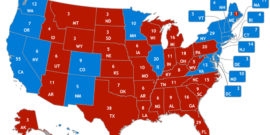The National Popular Vote movement reflects a shocking failure to understand the consequences that would ensue should such a system go into effect.
NPV and the Constitution
A quick note on Gary Greggs piece on the Electoral College: the National Popular Vote (NPV) compact, under which states would mutually pledge their presidential electors to support the winner of the national vote regardless of the electoral outcome within their own state, bumps up against the Compact Clause (Art. I Sec. 10 Cl. 3), providing that “no State shall, without the Consent of Congress, … enter into any Agreement of Compact with another state, or with a foreign Power.”
The modern-day Supreme Court has had occasion to pronounce on the clause, with the predictable but still unfortunate result that the clause now means very nearly the opposite of what it says: no state compact requires congressional consent unless it’s already unlawful for other reasons (such as federal preemption). U.S. Steel Corp. v. Multistate Tax Comm’n (1978). For an extended analysis of the Compact Clause and the MTC travesty see Greve, “Compacts, Cartels, and Congressional Consent,” 68 Missouri L Rev 285 (2003). Based on the MTC precedent, lower courts have upheld state compacts such as the 1998 Master Settlement Agreement on tobacco litigation, through which state attorneys general and the tobacco producers conspired to impose a $200 billion-plus nationwide tobacco tax without the vote of a single state or federal legislator. The Supreme Court has been too busy with patent cases and prison litigation to correct the error. S&M Brands, Inc v. Caldwell, 614 F.3d 172 (5th Cir. 2010), cert denied, 131 S.Ct. 1601 (2011). (The cert petition, authored by Eric Jaffe and Michael McConnell, as well as a supporting brief by Alan Morrison, Richard Epstein, and Kathleen Sullivan, are worth reading here and here.) So the states are cheerfully compacting along, signing greenhouse compacts and even treaties with foreign nations.
Even under the Court’s latitudinarian interpretation of the Compact Clause, however, there is a powerful argument that the NPV is a step too far. Derek T. Muller has a thoughtful riff on the subject; his article appears here.
